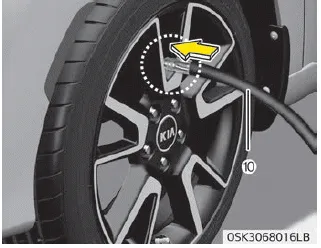Kia Soul (SK3): If you have a flat tire (with Tire Mobility Kit) / Checking the tire inflation pressure

1. After driving approximately 7~10 km ( 4~6 miles or about 10 minutes), stop
at a suitable location.
2. Connect connection hose (10) of the compressor directly to the tire valve.
3. Connect between compressor and the vehicle power outlet using the cable and connectors.
4. Adjust the tire inflation pressure to 230 kPa (33 psi). With the ignition switched
on, proceed as follows.
- To increase the inflation pressure: Switch on the compressor, position I. To check the current inflation pressure setting, briefly switch off the compressor.
WARNING
Do not let the compressor run for more than 10 minutes, otherwise the device will overheat and may be damaged.
- To reduce the inflation pressure: Press the button (9) on the compressor.
CAUTION
If the inflation pressure is not maintained, drive the vehicle a second time, refer to Distributing the sealant. Then repeat steps 1 to 4. Use of the TMK may be ineffectual for tire damage larger than approximately 4 mm (0.16 in).
We recommend that you contact an authorized Kia dealer if the tire cannot be made roadworthy with the Tire Mobility Kit.
WARNING
The tire inflation pressure must be at least 200 kPa (29 psi). If it is not, do not continue driving. Call for road side service or towing.
11. Immediately drive approximately 7~10 km (4~6 miles or, about 10min) to evenly distribute the sealant in the tire. CAUTION Do not exceed a speed of 80 km/h (50 mph).
Park your car at the side of the road so that you can work with the TMK away from moving traffic. Place your warning triangle in a prominent place to make passing vehicles aware of your location.
Other information:
Kia Soul (SK3) 2020-2025 Owners Manual: Towing
Towing service If emergency towing is necessary, we recommend having it done by an authorized Kia dealer or a commercial tow-truck service. Proper lifting and towing procedures are necessary to prevent damage to the vehicle. The use of wheel dollies (1) or flatbed is recommended.
Kia Soul (SK3) 2020-2025 Owners Manual: Vanity mirror lamp bulb replacement
WARNING Prior to working on the Interior lamps, ensure that the “OFF” button is depressed to avoid burning your fingers or receiving an electric shock. 1. Using a flat-blade screwdriver, gently pry the lamp assembly from interior. 2. Remove the bulb by pulling it straight out.
Categories
- Manuals Home
- Kia Soul Owners Manual
- Rear seat adjustment
- Drive mode integrated control system
- What to do in an emergency
- New on site
- Most important about car
